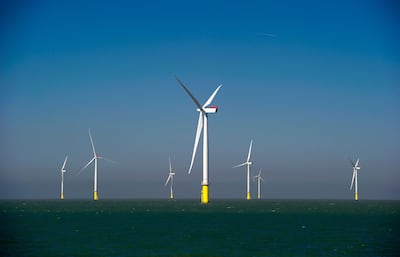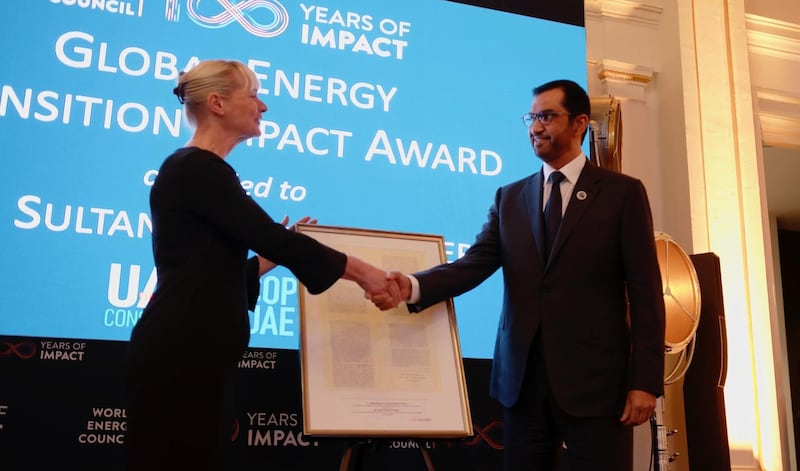Dr Sultan Al Jaber, Minister of Industry and Advanced Technology, has been honoured by the World Energy Council for his leadership during the crucial Cop28 climate talks.
The Cop28 President won the Global Energy Transition Impact Award in recognition of his role in overseeing a historic agreement at last year’s summit and in advancing the world's energy transition.
Cop28 ended with a deal known as the UAE Consensus under which many countries agreed to transition away from fossil fuels in energy systems.
The award comes at a time when the World Energy Congress is beginning in Rotterdam. The four-day event gathers energy leaders to discuss the global picture.
Accepting the award in the Dutch city on Sunday, Dr Al Jaber said the ground-breaking agreement was “a truly historic moment for climate diplomacy” and, during a time of geopolitical tension, “set a new standard for inclusivity”.
“We moved the world beyond self-interest for the common good and we set clear direction, guided by the science, for keeping our North Star of 1.5°C within reach,” said Dr Al Jaber, referring to the key climate threshold.
“We now need to show that same solidarity in turning an unprecedented agreement into unprecedented action.”
On energy transition, Dr Al Jaber said the global landscape had undergone many changes and wind and solar energy were registering an eightfold expansion, with the UAE at the forefront of this growth.

“If you sail from here into the North Sea, you will meet a white wall of windmills that the UAE, through Masdar, has invested in. Projects like the London Array, Dudgeon, Dogger Bank and Baltic Eagle are helping make Europe a world leader in wind power,” he said.
But he noted hydrocarbons still represented 80 per cent of today’s energy mix and with energy demand set to grow by about a quarter in the next two decades, the world will need to replace the daily equivalent of more than 270 million barrels of oil, gas and coal.
“This is a massive political, social, economic, technological and engineering challenges at the same time,” Dr Al Jaber said. “And every stakeholder has a critical role to play.”
Dr Al Jaber also repeated calls for countries to adopt comprehensive emission-reduction targets in their coming Nationally Determined Contributions (NDCs) – a country's national climate action plan – and for industries to collaborate on decarbonisation goals.
“Tripling renewable energy capacity is just the beginning,” Dr Al Jaber said. “We also need to expand nuclear, hydrogen, geothermal and other zero-carbon energies yet to be discovered or deployed.”
Dr Al Jaber also urged the adoption of emerging technology – especially artificial intelligence – that could “make a game-changing difference”.
“Cop28 was a turning point in history,” said Dr Al Jaber. “It was the moment that the world got serious about the energy transition and got real about what the transition will actually take.”
The energy transition will “take time, it will happen in different places at different paces” he said, “and we cannot simply unplug the current energy system before the new one is built”.
Dr Al Jaber was presented the award by Angela Wilkinson, secretary general and chief executive of the World Energy Council.
“His personal commitment and persistence have set a new direction in world energy towards accelerating decarbonisation with justice and resilience, leaving a lasting and positive impact on both society and the environment,” she said.
Dr Al Jaber's award was one of four inaugural “world energy leadership awards” presented at the council’s centennial dinner.






